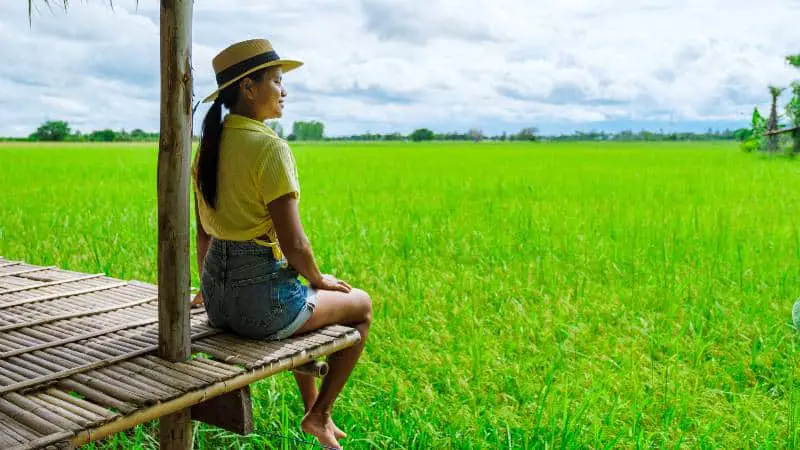Exploring Living Green in Thailand (Must Knows)
Are you looking to make a positive impact on the environment, while also taking the opportunity to explore new horizons? If so, embracing green living in Thailand may be the perfect way to achieve both. This Southeast Asian country is home to diverse and vibrant cultures, delicious food experiences, stunning landscapes and beaches, as well as plenty of eco-friendly activities.
From going off-the-beaten path by biking through rural villages to opting for locally sourced products in big cities – there are numerous ways travelers can embrace sustainable practices during their stay that will have a lasting effect. Whether traveling solo or with family and friends – take this chance to discover Thailand’s rich culture while making an environmentally conscious effort throughout your journey – we guarantee it will leave you feeling fulfilled!
From venturing off-the-beaten path by cycling through quaint rural villages to choosing locally sourced products in bustling cities, travelers have a multitude of opportunities to wholeheartedly embrace sustainable practices during their stay. These conscious choices not only leave a lasting impact but also contribute to a more harmonious world.
Key Takeaways
- Thailand’s rich history has always been intertwined with nature, and as modernization occurs, there’s a conscious effort to merge traditional practices with new eco-friendly initiatives.
- Visitors play a crucial role in supporting Thailand’s green initiatives, from choosing sustainable accommodations to participating in eco-tourism activities.
- Local communities are the backbone of Thailand’s eco-movement, leading initiatives that both preserve their heritage and protect the environment. Supporting these communities ensures a sustainable future for Thailand.

Historical Context
The historical context of Thailand’s environmental preservation is intrinsically connected to their traditional practices. This beautiful Southeast Asian country we now know, blessed with abundant natural beauty, biodiversity, and cultural richness, owes much of its environmental sustainability to customs carried down through generations. Rooted in their livelihood and spirituality, the Thai people’s relationship with the environment has been predominantly symbiotic and respectful, contributing significantly to their eco-friendly ethos.
Historically, traditional Thai practices that were inherently eco-friendly incorporated a host of activities, structured around living in harmony with nature. For instance, the age-old practice of building stilt houses over water bodies like rivers and canals minimized soil erosion and land destruction, providing an eco-friendly living solution. Similarly, Thai farming methods, such as integrated fish and paddy cultivation, popularly known as “rice-fish culture”, embodied an outstanding model of sustainable farming.
Traditional Thai diet, mostly pescatarian and plant-based, significantly reduced carbon footprints compared to meat-based diets. Furthermore, the use of natural materials like banana leaves for packaging food not only eradicated the need for plastic but also enriched the soil as these materials decomposed. Even spiritual practices, like tree ordination where trees were ‘ordained’ and wrapped in Buddhist monk’s robes to protect them from logging, explicitly exhibit the Thai’s respect and veneration for nature.
However, these eco-centered practices found themselves at odds with modernization’s whirlwind. With the advent of the 20th century, Thailand began a dramatic shift towards modernization and industrialization. While the urban sprawl and economic growth propelled Thailand onto the global stage, it significantly disrupted the harmony between the Thai people and their environment.
Technological advancement, growing consumerism, increased urbanization contributed to surges in pollution and waste production. Industrial activities, especially in sectors like manufacturing, construction, and agriculture, caused environmental degradation on a scale previously unseen. Deforestation, soil degradation, air and water pollution, and biodiversity loss becoming much more pressing issues.
Furthermore, modernization brought about a change in lifestyle and livelihood, taking people away from their traditional way of living. The shift from locally sourced diets to processed food increased the consumption of plastic packaging. Infrastructure developments sometimes saw the destruction of previously preserved natural locations.
In this narrative of change and transformation, Thailand’s journey from an eco-conscious society rooted in traditional practices to a fast-modernizing nation grappling with environmental concerns serves as a stark reminder of the consequences of unchecked progress. It underlines the importance of conscientiously integrating sustainable practices into modern lifestyles, without completely abandoning traditional wisdom.
While a return to the past may not be feasible, embracing sustainability and learning from historical eco-friendly practices could serve as a guideline for re-adjusting the relationship between humans and their environment in the future. And as an eco-conscious fellow, it is incredibly exciting and significant to see how contemporary Thailand attempts to negotiate these challenges, realigning itself with its historical reverence for the environment.
Eco-Friendly Accommodations
Thailand, a vibrant tropical oasis, is known worldwide for its golden sandy beaches, lush greenery, rich historic architecture, diverse wildlife, and more importantly, its welcoming, warm-hearted people. And over the years, Thai hospitality has evolved to don another feather in its cap: a booming growth of eco-friendly accommodations.
As environmental consciousness is on the rise, eco-resorts and green hotels are flourishing all across Thailand, offering nature enthusiasts an opportunity to bask in the country’s beauty without compromising on sustainability. These environmentally-conscious accommodations range from humble, low-impact beachfront bungalows to luxurious, sustainable resorts nestled in the heart of the jungle. They provide not just a roof over your head, but an experience to live close to nature, relish local culture, and witness eco-friendly practices in action.
Eco-resorts in Thailand like Zeavola Resort on Phi Phi Island, Elephant Hills in Southern Thailand, or Faasai Resort and Spa in Chanthaburi, are all incredible examples of combining luxury with preservation by using local materials in construction, implementing waste management systems, promoting local food, and conserving water and energy. Green hotels in bustling cities like Bangkok, such as Shangri-La and the Sukhothai, also prioritize sustainability with their initiatives, including energy-efficient practices, waste reduction, and long-term sustainability goals.
Choosing these sustainable accommodations comes with an array of benefits, both tangible and intangible, worth considering. For starters, they help reduce your carbon footprint while traveling. Whether it’s through sustainable construction methods, energy-saving strategies, or supporting local agriculture by offering local organic food, every small act at these places contributes to a larger cause.
Moreover, these accommodations often offer unique cultural experiences by encouraging interaction with local communities and providing insight into their customs and traditions. By supporting artisanal crafts, hosting local cultural performances, and serving authentic local cuisine, they also contribute significantly to preserving traditional Thai heritage.
Lastly, the satisfaction gained from making an environmentally responsible choice can’t be overstated. Along with making your stay comfortable, eco-friendly accommodations cater to the growing demand for a guilt-free vacationing experience. It’s a thrilling opportunity to be a part of something larger, to contribute to preserving the world’s natural wonders, and to help sustain the local economy.
In conclusion, this rise of eco-resorts and green hotels in Thailand is an encouraging step towards marrying travel with sustainability. It’s a testament to the Thai people’s resilience and their dedication to preserving their environment and culture amidst modernizations. And as travelers who are passionate about greener choices, we get to be a part of this magnificent journey – a truly rewarding experience!
Sustainable Transportation
When it comes to sustainable transportation, Thailand stands as an outstanding example. Much like its approach to eco-friendly accommodations and agricultural practices, this charming country offers a diverse array of environmentally conscious transit options. This not only reduces carbon footprints but also showcases a distinct essence of Thai culture.
One of the most iconic means of transportation in Thailand is the tuk-tuk. These small, motorized rickshaws darting through the lanes of Bangkok and other Thai cities are as quintessential to Thailand as its temples and vibrant street markets. Reduced carbon emissions, due to their smaller size and engine capacity compared to regular cars, make them a greener option for short-distance travel. Many cities, such as Chiang Mai, are also exploring electric tuk-tuks, which could further reduce their environmental impact.
Next in line are bicycles, another fantastic alternative for environment-friendly commutation. Cycling not only helps to reduce air pollution and greenhouse gas emissions but also encourages physical fitness. Many cities in Thailand have worked towards becoming more bike-friendly, improving infrastructure such as bike lanes and bike-sharing facilities. Some eco-resorts even provide bicycles for guests to explore the surroundings, contributing to sustainable tourism.
Another timeless means of transportation in this context is simply walking. While it might be underappreciated in the era of rapid transportation, walking is the most eco-friendly way to explore places, especially for short distances. In historic places like the Ancient City of Ayutthaya or the quaint lanes of Old Phuket Town, walking allows travelers to truly immerse themselves in their surroundings, all while leaving no carbon footprint!
Shifting our gaze to public transport systems, these also hold significant potential for sustainability in transportation. The Mass Rapid Transit (MRT) system and the Bangkok Skytrain (BTS) in Bangkok, or the songthaew shared taxis seen all over Thailand, are prominent examples. Apart from reducing individual car usage, these systems often incorporate green initiatives. For instance, the BTS has been making efforts to reduce its energy consumption, while initiatives to upgrade the MRT to a more energy-efficient system are underway.
By choosing these public transportation systems, you not only contribute to reducing traffic congestions but also contribute significantly to air quality improvement. Moreover, it’s an excellent opportunity to witness day-to-day life in Thailand, adding another layer to your travel experience.
From the buzzing tuk-tuks and bicycles twirling through Thai streets to efficient public transportation systems, Thailand’s approach to sustainable transportation is both fascinating and inspiring. It serves as a testament to the fact that preserving the environment does not necessarily mean compromising on convenience or cultural authenticity. As travelers, opting for these modes of transport aligns our love for exploring new places with a commitment to preserving them, adding a whole new dimension to our adventures in this mesmerizing country.
Local and Organic Eating
Local and Organic Eating
In recent years, Thailand has wholeheartedly embraced the farm-to-table movement, adding yet another layer to its illustrious culinary scene. As a country steeped in agricultural history, this shift towards locally-sourced, organic eating resonates not only with the global shift in food consciousness but also aligns with its cultural roots. The farm-to-table movement supports local farmers, fosters an understanding of sustainable food practices, and prioritizes fresh, high-quality ingredients for a remarkable gastronomic experience.
By sourcing its ingredients straight from local farms, the farm-to-table movement empowers Thai farmers while ensuring traceability and sustainability in the food supply chain. This results in a reduced environmental footprint as ingredients travel shorter distances, minimizing transportation-related carbon emissions. In turn, this supports Thailand’s eco-friendly ethos and re-establishes the country’s connection with its agricultural roots.
When it comes to popular organic markets in Thailand, one must-visit destination is the renowned Khlong Toey Fresh Market in Bangkok. Its vibrant atmosphere, with stalls brimming with fresh produce, locally-sourced meat, poultry, and seafood, is a treat for the senses. Another notable market is the Organic Farmers Market at the Bangkok Adventist Church compound, a hub offering a vast selection of fruits, vegetables, and various organic products directly from farmers.
In Chiang Mai, the Jojo Organic Market is a favoured spot among those seeking healthy options, while the Saturday Evening Farmer’s Market by the Chiang Mai University is a delightful place to revel in local and organic produce.
Besides markets, an increasing number of eateries focused on locally-sourced, organic ingredients have emerged across Thailand. Bangkok’s Farm-to-Table Café, located close to the bustling Chatuchak Market, is a haven for those desiring home-style Thai meals made from freshly-sourced ingredients. Similarly, Haoma, another gem in the heart of Bangkok, fuses urban farming with fine dining, as the restaurant harvests a majority of its ingredients from its on-site garden.
In Chiang Mai, well-loved establishments such as Rustic and Blue and Bird’s Nest Café place the farm-to-table philosophy at the forefront of their operations, delivering exceptionally fresh and delicious dishes, perfect for those seeking organic food options.
When it comes to local and organic eating in Thailand, the farm-to-table movement not only offers a chance to indulge in mouth-watering Thai cuisine but also adds value through its inherent sustainability. This culture of conscious eating reminds us that the culinary choices we make can have a much larger impact, beyond just our taste buds.
By supporting farmers, preserving biodiversity, and minimizing environmental impact, Thailand’s farm-to-table movement enriches the dining experience while synergizing with its eco-ethos and simultaneously fostering the harmony between taste and sustainability.
Waste Management and Reduction
In recent years, Thailand has emerged as a front runner in the global race towards effective waste management and reduction. Amidst an increasing global consciousness about the catastrophic environmental impacts of plastic pollution, Thailand has taken significant strides in reducing plastic usage, making recycling a common practice and leveraging composting for organic waste.
One of the most formidable steps in Thailand’s fight against plastic pollution was the country’s major retailers pledging to stop providing single-use plastic bags to customers at the start of 2020. With banners reading “No Plastic Bags” seen across shopping malls and convenience stores, this initiative presents a radical shift in consumer habits. Furthermore, the Thai government aims to completely ban three types of plastic – lightweight plastic bags, styrofoam food boxes, and plastic straws – by the end of 2022.
However, the efforts are not limited to regulatory measures. Many local communities, businesses, and initiatives are also joining the fight. Notable examples include Trash Hero and Grin Green International – organizations that regularly organize beach clean-ups and awareness programs. Moreover, local markets are encouraging visitors to bring their own bags, containers, and utensils, fostering a culture of reusable items over single-use plastic products.
The importance of recycling cannot be overstated in this context. In Thailand, several recycling initiatives, both government-led and community-based, are helping in effective waste management. The country has implemented extensive waste-separation and recycling programs, while businesses are deploying incentives to encourage recycling amongst consumers. For example, the ‘Recycle and Reward’ program by Tesco Lotus and the concept of ‘reverse vending machines’ at 7-Eleven stores provide shoppers with coupons in exchange for their recyclable waste.
Alongside recycling, composting has also gained traction in Thailand, especially for managing organic waste. A significant portion of Thailand’s waste comes from food and kitchen waste, which is eminently suitable for composting. Communities and households across the country are setting up composting systems, transforming organic waste into nutrient-rich compost for plants and gardens.
In conclusion, when it comes to waste management and reduction, Thailand is gradually but consistently transforming its practices. The efforts to reduce plastics are a positive push towards a sustainable future. Still, it’s also a reminder that our collective actions – be it carrying a reusable bag, recycling a water bottle, or composting kitchen waste – contribute significantly to maintaining the ecological balance of our beautiful planet. As visitors and as inhabitants of this shared earth, every step we take towards waste reduction and management is a stride towards sustaining our environment for future generations.
Eco-Tourism Activities
Thailand, with its rich biodiversity and lush natural landscapes, offers various eco-tourism activities that enable visitors to have an intimate and responsible connection with its environs. While it is vital to have memorable experiences while traveling, it is equally important to minimize our negative impacts on the environment or disturb local habitats. In this spirit, Thailand has developed numerous wildlife conservation projects and sustainable trekking and nature tours, which cater to the eco-minded traveler.
Wildlife Conservation Projects
Thailand is home to many wildlife conservation projects designed to protect and preserve its rich flora and fauna. These initiatives not only offer visitors the opportunity to experience wildlife ethically but also serve as platforms for learning, contributing time and skills to the preservation of these species.
- Elephant Nature Park – Located in Chiang Mai, the Elephant Nature Park is an esteemed elephant rescue and rehabilitation center. Here, visitors can contribute to the welfare of these magnificent creatures by volunteering to bathe, feed, and care for the elephants, while also learning about their natural habitat and conservation efforts.
- Wildlife Friends Foundation Thailand (WFFT) – WFFT, situated in Petchaburi, aims to rescue and rehabilitate animals that have been exploited or impacted by human activity. As a volunteer, you can assist in the care of various species, including primates, elephants, and birds, all while gaining a deeper understanding of their importance in Thailand’s ecosystems.
- Marine Conservation Projects – For ocean enthusiasts, several marine conservation projects focus on protecting Thailand’s vibrant marine life. Organizations like Projects Abroad, GVI, and Love Wildlife offer programs that involve coral restoration, diving to survey marine ecosystems, or contributing to the conservation of sea turtles or other threatened marine species.
Sustainable Trekking and Nature Tours
Thailand’s substantial forest reserves and stunning landscapes offer picturesque backdrops for sustainable trekking and nature tours. Through these eco-friendly activities, travelers have the chance to enjoy Thailand’s natural beauty while minimizing their environmental impact.
- Chiang Mai and Northern Thailand Treks – Opt for guided eco-tours through the lush jungles and scenic rural landscapes of Northern Thailand, which focus on minimal impact trekking, community-based tourism, and respect for local cultures. Notable companies like Pooh Eco-Trekking, Trekking Collective, and Chiang Mai Trekking provide environmentally responsible trekking options, often led by local hill tribe guides.
- Khao Sok National Park – Situated in Southern Thailand, this ancient rainforest boasts an array of eco-friendly trekking opportunities and guided nature tours. By engaging with responsible tour operators like Green Andaman Travel or Limestone Lake Rainforest Tours, the journey through Khao Sok remains in harmony with its pristine ecosystems.
- Eco-friendly Island Hopping – While exploring Thailand’s breathtaking islands, it is essential to adhere to sustainable practices. Companies like Blue Guru Conservation, Andaman Discoveries, and Paddle Asia offer environmentally conscious island-hopping tours that prioritize the region’s ecological well-being.
In summary, Thailand’s eco-tourism activities, be it wildlife conservation projects or sustainable trekking and nature tours, demonstrate that engaging with nature must go hand in hand with preserving and respecting it. These responsible experiences not only leave us with lasting memories but also ensure the continued existence of these unique ecosystems for generations to come.
Community Initiatives
Community Initiatives
In Thailand, local communities have increasingly taken center stage in promoting sustainable practices, fostering environmental stewardship, and facilitating responsible tourism. By empowering communities to be eco-champions, the collective effort towards preserving their culture and surroundings becomes even stronger.
A few notable community initiatives encouraging sustainable practices in Thailand include:
- Mae Kampong Village – Located in the Chiang Mai province, this village is a shining example of community-based tourism. They emphasize eco-friendly practices, local culture preservation, and traditional ways of life. Visitors can experience homestays, learn about organic farming, and participate in age-old handicraft demonstrations.
- Koh Yao Noi – An island community in Phang Nga Bay, Koh Yao Noi is committed to safeguarding its natural beauty and local way of life through community-wide eco-awareness. The island employs various sustainable practices in tourism, such as recycling, composting, and traditional fishing methods. Local businesses like the Mina Art Café and the Koh Yao Earth Project exemplify this ethos.
- Bang Kachao – Also known as Bangkok’s Green Lung, this area is an oasis amidst Thailand’s bustling capital. Local communities have worked together to preserve its lush, verdant landscapes, offering bike tours, floating markets, and parklands as sustainable attractions.
How Tourists Can Support These Initiatives
As tourists, we can support community initiatives in various ways, ensuring that we contribute positively to the regions we visit while maintaining their environmental and cultural integrity:
- Choose sustainable accommodations and eco-tours – When selecting where to stay or booking a tour, explore options that prioritize eco-friendliness, community involvement, and responsible tourism.
- Shop locally – Support locally-owned businesses, artisan markets, and community-run shops. By doing so, you encourage local enterprises, promote cultural preservation, and contribute to the local economy.
- Respect local customs and traditions – Be informed about the customs and traditions of the community you are visiting. Refrain from engaging in improper behavior that might offend local sensibilities or harm the environment.
- Adopt eco-friendly practices – Engage in sustainable travel practices such as using refillable water bottles, avoiding single-use plastics, sticking to designated trails, and disposing of waste properly.
- Volunteer with community projects – Participate in volunteer programs that align with your interests and are beneficial to the local community. These experiences can provide valuable hands-on learning while enabling you to contribute to a project’s long-term success.
Supporting community initiatives in Thailand goes hand in hand with participating in sustainable tourism. By empowering local communities to preserve their natural surroundings and cultural heritage, we can ensure a perpetually vibrant and flourishing Thailand that offers visitors unique and mesmerizing experiences, leaving only positive footprints behind.
Challenges and Opportunities
Challenges and Opportunities
Thailand’s rapid economic growth and development have brought forth considerable environmental challenges that the country must address for a sustainable future. However, these challenges also present significant opportunities for growth in the green sector.
Current Environmental Challenges Faced by Thailand
- Air Pollution – Urbanization and motorization in cities like Bangkok have produced significant air pollution, resulting in dangerous smog during certain months. Industrial emissions, road transportation, and wildfires contribute to the high levels of PM2.5 fine particulate matter in the air.
- Water Pollution – Thailand faces considerable issues with water pollution, caused by factories, agriculture, and urban sewage. Wastewater is often discharged into rivers and seas, affecting water quality, ecosystems, and marine life.
- Deforestation and Loss of Biodiversity – Over the past few decades, deforestation caused by agriculture, illegal logging, and infrastructure development has led to a loss of natural habitats, negatively impacting biodiversity and contributing to climate change.
- Marine Debris and Plastic Pollution – Thailand ranks among the world’s largest contributors to plastic waste and subsequent marine debris. Single-use plastic items, inadequate waste management systems, and littering have led to serious pollution on Thailand’s beaches and in its waters.
- Climate Change and Natural Disasters – As a coastal country, Thailand is particularly vulnerable to climate change-induced natural disasters, such as increased floods, droughts, and storms. These events cause widespread damage and economic losses, impacting human life, agriculture, and infrastructure.
Opportunities for Growth in the Green Sector
- Renewable Energy – Thailand has substantial potential to expand its renewable energy sector. By investing in solar, wind, hydro, and biomass energy, the country can transform its power generation landscape and reduce its dependence on fossil fuels.
- Sustainable Agriculture – Agroforestry, organic farming, and permaculture provide tremendous scope for growth, allowing Thailand to transition towards sustainable and eco-friendly agriculture practices that minimize environmental impacts and contribute to food security.
- Green Tech and Innovations – Thailand stands to benefit from growing its green technology sector, focusing on innovations that address environmental challenges while generating long-term economic opportunities, such as electric vehicles, solar panels, and waste management technologies.
- Eco-Tourism and Community-Based Tourism – Embracing and promoting eco-tourism and community-based tourism holds vast potential for Thailand. This approach supports the local economy, preserves cultural heritage, and minimizes negative impacts on the environment.
- Marine and Coastal Conservation – Investing in marine and coastal conservation initiatives, such as protecting fragile marine ecosystems, establishing marine protected areas, and combatting illegal fishing, can promote ecological well-being while boosting responsible tourism.
In conclusion, while Thailand faces multiple environmental challenges, each of these obstacles presents an opportunity to invest in and foster sustainable growth in the green sector. By focusing on these opportunities, Thailand can work towards a more diverse, sustainable, and eco-friendly economy, ultimately benefiting its citizens, its natural ecosystems, and its cultural heritage.

Living Green in Thailand FAQs
Is Thailand an eco-friendly country?
Thailand is working towards a more eco-friendly future, with initiatives to reduce air and water pollution, combat deforestation, and increase renewable energy production. Additionally, the country has established numerous protected areas for wildlife conservation and is increasingly promoting sustainable tourism practices.
How is Thailand eco-friendly?
Thailand is eco-friendly in a variety of ways. The country has implemented measures to reduce air and water pollution through stricter regulations on industry, increased renewable energy production, and improved waste management systems. Additionally, Thailand has numerous protected areas for wildlife conservation as well as initiatives to promote sustainable tourism practices.
What is the green growth strategy in Thailand?
The green growth strategy in Thailand focuses on transitioning away from fossil fuels and towards renewable energy sources. The country also seeks to reduce air and water pollution, combat deforestation, promote sustainable tourism practices, and increase investment in initiatives related to marine conservation. The ultimate goal is to create a diverse, eco-friendly economy that benefits both citizens and the natural environment.
Is Thailand going green?
Yes, Thailand is making efforts to transition towards a greener future. The country has implemented measures to reduce air and water pollution, conserve wildlife habitats, combat deforestation, and increase renewable energy production. Additionally, Thailand is increasingly promoting sustainable tourism practices.
What are the most eco-friendly cities in Thailand?
The most eco-friendly cities in Thailand are Chiang Mai, Bangkok, and Phuket. Chiang Mai is home to numerous environmental conservation initiatives, including efforts to combat air and water pollution, reduce deforestation, and promote renewable energy production. Meanwhile, Bangkok has implemented measures such as electric vehicle subsidies and green building standards that encourage eco-friendly practices.
What is Thailand doing for sustainability?
Thailand is making efforts to become more sustainable by reducing air and water pollution, combatting deforestation, and increasing renewable energy production. The country has also implemented initiatives to conserve wildlife habitats, promote sustainable tourism practices, and invest in marine conservation.
Conclusion
We have seen that preserving and protecting Thailand’s environment takes a conscious effort on the part of both locals and visitors. From choosing sustainable accommodations to participating in eco-tourism activities, travelers can positively contribute to helping Thailand stay green. By supporting local communities, we can help ensure that their environmental initiatives are successful and create a better tomorrow for this incredible country. So, make sure you start planning your trip to Thailand with sustainability proactivity and dedication to preserving the natural environment in mind!
You can look into different ways you might be able to support local projects when you plan your visit or perhaps even join already established initiatives currently taking place.
Don’t forget to subscribe to our newsletter here at Better Living Asia for the best information about living sustainably in the region, or don’t hesitate to reach out directly if we can provide assistance of any kind. The future is now when it comes to sustainability efforts — so let’s take action today!





